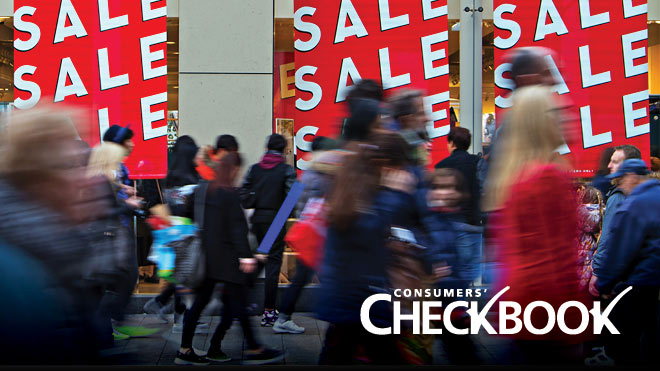
10 Tricks Stores Use To Get You To Spend More
With holiday shopping season upon us, getting a great deal is top of mind. Our friends at Consumers' Checkbook compiled a list of tactics online and brick-and-mortar stores use to get you to think you are getting a great deal, even if you're not.
Companies use an arsenal of marketing tricks to lead customers to believe they're scoring bargains. Even though prices might vary considerably from one company to the next, people often don't shop around — but not necessarily for the reasons you might think.
Sure, it's a pain to scour the internet for the lowest price on a TV. More often, though, buyers don't compare prices because they're convinced they already found a great deal.
During Consumers' Checkbook's nearly 50-year history, its secret shoppers have obtained more than a million prices for everything from alternators to zucchini, from hundreds of types of retailers and service providers. All that research adds up to one key piece of advice: If you want a great deal on anything you buy, shop around.
Here are 10 sneaky pricing and selling strategies to watch out for. Be aware that some companies employ more than one.
1. Constant Sales
"Many retailers constantly advertise big savings. But these promotions usually aren't discounts at all.
After tracking prices of big-ticket items sold at 25 major retailers for six months, Consumers' Checkbook found that sale prices at 21 of the stores were often bogus, with supposedly lower prices being offered more than half the time.
At some stores, the fake sales never end: For several chains, most items were offered at a false discount almost every week researchers checked. In other words, the "regular price" shown on price tags is seldom — if ever — what customers actually pay.
These special-but-not-really-special discounts, holiday sales and red-hot-spring/summer/whatever events are meant to manipulate you into buying items right away, while "on sale," lest you soon face higher prices. It dissuades you from shopping around. After all, if something is "60% off," what's the point of comparing prices elsewhere?
All this good-deal euphoria is also designed to make you snap up more stuff while you're at it.
2. Inflated Anchor Prices
On the flip side of constant sale pricing is fake "regular" pricing, referred to in the industry as "anchor prices." Most stores now show prices that are crossed out with lower "sale" prices splashed nearby. Those crossed-out higher "list" prices are rarely if ever charged by the store or its competitors; they're gimmicks to make that day's prices seem like bargains.
3. Scarcity Warnings
Demand is high! Supply is low! Act quickly or you won't get that hotel room/pair of sandals/grill. Usually, it's a ruse to make you buy now. Don't let warnings like these deter you from shopping around. Even if someone else buys that last discontinued sofa, salespeople are always happy to find something else to sell you.
4. Free or Inexpensive Trial Periods
Companies that offer subscriptions often bait their sales hooks with introductory discounts or reduced-cost trial memberships, knowing that once customers sign up, they'll later pay higher rates month after month.
Every year or two, reevaluate your business relationships, particularly your cable and cellphone bills, bank accounts and credit card accounts to make sure you're not paying for something you're not using — or no longer getting the best rate for.
5. Special Treatment
"Because you've been a great customer..." "Because we have a crew working nearby..." "Because we have leftover materials..." "Because you're a parent or a senior..." "Because you belong to (insert club/group/association name here)..." Salespeople know if they can convince you that you're getting special treatment, you'll feel good about their offers and might not shop around to find better prices or terms.
6. Fake Deadlines and Limited-Time Offers
Don't assume that "clearance" or "clear out" sales signify amazing deals. You might have seen or heard advice that claims there's a best time of year to buy something because retailers need to clear out old inventory — for example, wait until the end of summer to buy a new grill or lawnmower. These claims generally have no merit. Consumers' Checkbook's shoppers find "clearance" items available for the same price from the same store months later.
Deadlines show up in other high-pressure sales environments: Gyms offering to waive hundreds of dollars in initiation fees if you sign up today; free upgrades that won't be around after you leave the room or webpage. Salespeople know that if you back off from their offers, you probably won't return. By setting immediate deadlines, they hope you'll stop your pesky contemplation and buy already.
7. Hidden Fees
Unfortunately, for many services, the prices you're offered are rarely the total you'll actually pay. Often, when shopping online you won't learn about the true cost of a product or service until you reach the checkout screen.
8. Charm Prices
Stores display prices ending in 99, 98 or 95 to make prices appear lower: $9.99 is perceived as "$9 and change," rather than $10. It's actually not the "99" or "95" at the end of the price that affects us. It's that shoppers pay most attention to the left-most numbers in a price; $199 seems a lot better than $200.
Also effective is pricing using seemingly random amounts — say "$328.46." This makes it look like prices were carefully set so they are as low as possible.
9. Alternative Payment Methods
Many companies have taken a cue from casinos' use of chips by pushing alternative payment methods. For example, using Starbucks' mobile app to pay for daily $5 lattes feels like you're not spending real money.
Gift cards are another way retailers can get you to spend more. They collect money up front for future purchases and tie gift recipients into buying stuff from them rather than the competition.
There's a decent chance the gift card will get lost or forgotten, and any money you don't spend on the card is profit for the company. It's estimated that there are about $27 billion in unused gift cards sitting in wallets and dresser drawers nationwide.
Customers also tend to buy enough stuff to "use up" the full amount on gift cards and often need to pay more than the gift card balance to cover the whole purchase. Plan your purchases so that your cost stays close to the gifted value.
10. Easy Math
Some retailers, especially those with pricey products, advertise discounts as nice round dollar savings ("Save $100"), rather than as a percentage off. The idea is that you'll more easily absorb the supposed deal.
Similarly, some stores group items for one price (4 for $10). You'll buy four of them, even if you can buy just one for $2.50. We all fall for this.
More Retailer Tactics
If you like these tips, you can find 20 more in the full article on Consumers' Checkbook's website: Manipulative Marketing Is Now the Norm: 30 Tricks Sellers Use to Make You Pay Up and Pay Too Much.
About Consumers' Checkbook
Puget Sound Consumers' Checkbook and Checkbook.org are a nonprofit organization with a mission to educate and help consumers. Checkbook also evaluates local service providers — home improvement contractors, doctors, dentists, veterinarians, stores and more. It is supported by consumers and takes no money from the companies it evaluates. BECU members can sign up for free access to Consumers' Checkbook for one year.
The above article is intended to provide generalized financial information designed to educate a broad segment of the public; it does not give personalized financial, tax, investment, legal, or other business and professional advice. Before taking any action, you should always seek the assistance of a professional who knows your particular situation when making financial, legal, tax, investment, or any other business and professional decisions that affect you and/or your business.


